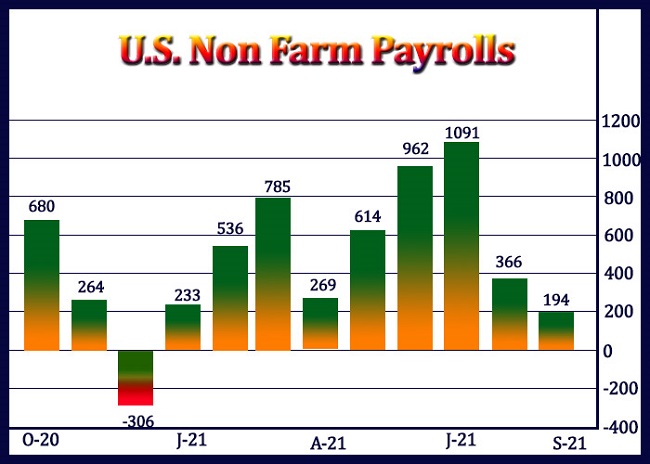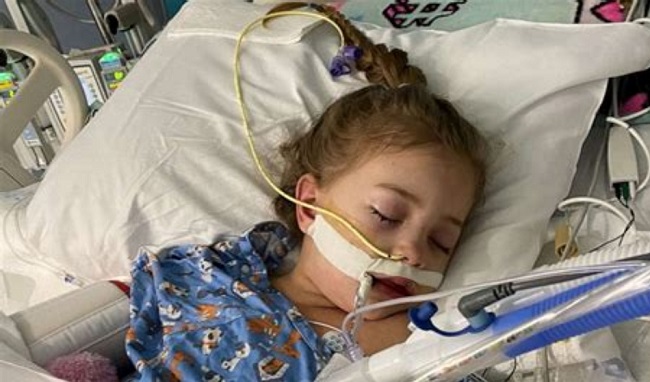When you think of police officers dying in the line of duty, you probably think of them chasing down a criminal and being shot or getting run over by a getaway car. So far this year, 356 law-enforcement officers across the country have died in what have been classified as line-of-duty deaths. But just 49 of them died by gunfire and 16 by vehicles. These are relatively small numbers compared to the 228 officers who died from COVID-19, according to the Officer Down Memorial Page, an online tribute to officers compiled by a nonprofit dedicated to giving the public the chance to “remember the fallen and honor their sacrifices.” But this year, COVID-19 has turned that mission on its head. For is it really a “sacrifice” to die because you turned down a life-saving vaccination against an airborne-spread illness? The memorial page notes that the coronavirus is the No. 1 killer of law-enforcement officers this year. “Getting vaccinated is just as important as wearing your vest and your seat belt,” it says. “Don’t wait any longer, please consult your doctor to see if vaccination is right for you.” And yet, sadly, officers have been hesitant, and it has led to their preventable, premature deaths – and no telling how many other deaths of those they encountered on the job. Continue reading “Hesitancy to get vaccinated from COVID-19 kills more police officers than gunfire”
Harvard Immunologist Champions At-Home Covid Test Kits
The idea is that when used widely and frequently, the detectors, similar to a home pregnancy test, could stop outbreaks before they begin. Such countries as Germany and the U.K. have invested heavily in the tests, making them available cheaply, or even free. Others, including the U.S., have stuck with a more sensitive laboratory test that often must be administered by trained personnel and can take days to return results, depending on the lab’s processing capacity. “I’ve just been banging the drum about this really simple tool that frankly, could have prevented the outbreaks of last winter,” says Mina. “It could have—especially when we had no vaccines—saved hundreds of thousands of lives.” Rapid testing may finally be having its moment. Even in countries with plenty of vaccine supply, policymakers are coming to the realization that shots alone might not be enough to stop the virus, especially its more infectious delta variant. President Joe Biden said on Sept. 9 that he would spend $2 billion on 280 million rapid tests, and his administration announced an additional $1 billion purchase this month—part of a group of measures that officials say should quadruple the number available for home use by December. It’s not enough, but it’s a start, Mina says. Mina likes to compare the rapid technology to fire engines at a burning building, while the laboratory test is emergency responders arriving to a building after it’s burned down to embers. In other words, the rapid tests are good enough to catch what they need to, picking up the people who are likely more infectious. Modeling he’s done shows that twice-weekly rapid testing is effective at stopping significant viral spread, even if only half the people do it, and some mess up the test or it simply fails.So while rapid tests may not be perfect, they can play an important role in helping businesses—and by extension, entire economies—chart a path back to normalcy. In one of the first randomized clinical trials, same-day screenings paired with N95 face mask. NN: We are at the end of the line in test kits. Maybe we will have them for the next 2 weeks. We are at the end of the line. Now is the time to stock up. Testing is your last line of defense for you and your loved ones. The antivirals you are hearing about ONLY work in the first few days of infections…. We test everyday here. At the least you should test twice a week…
Radio Free Wall Street
Self Imposed Lock Down

Politicians are afraid of an uprising so they’re allowing massive spreader events. Smart people are in isolation.
Studies confirm waning immunity from Pfizer vaccine
Two real-world studies published Wednesday confirm that the immune protection offered by two doses of Pfizer’s Covid-19 vaccine drops off after two months or so, although protection against severe disease, hospitalization and death remains strong. The studies, from Israel and from Qatar and published in the New England Journal of Medicine, support arguments that even fully vaccinated people need to maintain precautions against infection. One study from Israel covered 4,800 health care workers and showed antibody levels wane rapidly after two doses of vaccine “especially among men, among persons 65 years of age or older, and among persons with immunosuppression.” Continue reading “Studies confirm waning immunity from Pfizer vaccine”
Merck prices Molnupiravir at a 4000% mark up
Merck is the Big Pharma company producing an experimental antiviral pill for Covid-19 treatment is accused of selling the drug to the US at 40 times the cost of its production, found a report. Molnupiravir, manufactured by pharmaceutical company Merck, has entered into a contract with the US government to supply 1.7 million courses at a price of $700 per course.
Continue reading “Merck prices Molnupiravir at a 4000% mark up”
Illinois toddler fights for his life as COVID transmission rages

Continue reading “Illinois toddler fights for his life as COVID transmission rages”
French health authority recommends third vaccine shot for health workers
PARIS, Oct 6 (Reuters) – France’s health authority (HAS) is recommending a third COVID-19 vaccine booster shot for health workers, it said in a statement on Wednesday.
https://youtu.be/JZgFTnpGmpM
New York’s largest healthcare provider fires 1,400 unvaccinated workers
(Reuters) – New York State’s largest healthcare provider, Northwell Health, has fired 1,400 employees who refused to get COVID-19 vaccinations, according to a spokesman, Joe Kemp. As with other healthcare companies that have recently terminated workers for not complying with vaccine mandates, the fired employees represent a small percentage of Northwell’s workforce of more than 76,000, all of whom are now inoculated. New York’s vaccination mandate for healthcare workers went into effect last week. Several other states, including California, have imposed similar measures. Officials have credited the requirements with increasing the rate of vaccination, though a small number of employees have decided they would rather lose their jobs than get shots https://www.reuters.com/world/us/few-skeptical-us-hospital-workers-choose-dismissal-over-vaccine-2021-10-03. Northwell announced its vaccine mandate in August, weeks before the state requirement. The company’s mandate extended to both clinical and non-clinical workers. “Our goal was not to terminate employees,” Kemp said. “Our goal was to get people vaccinated.” Kemp said the terminations will have no impact on patient care at Northwell’s 23 hospitals and other facilities. “Northwell regrets losing any employee under such circumstances,” the company said in a statement. “We owe it to our staff, our patients and the communities we serve to be 100 percent vaccinated against COVID-19.”
Pfizer/BioNTech COVID-19 vaccine effectiveness drops after 6 months – study
Pfizer-BioNTech’s COVID-19 vaccine is notably less effective six months after the second dose is administered, a new study finds. Researchers from King’s College London in the UK analyzed COVID-19 testing data and found the vaccine’s effectiveness falls from 88 percent to 77 percent after five to six months. They could not determine whether the lower effectiveness caused an increase in hospitalizations or deaths. The findings could spell trouble in the U.S., where more than 100 million people have received at least one dose of the vaccine – especially as the Indian ‘Delta’ variant continues to spread, causing cases to surge. Federal officials hope that plans to administer boosters in September – pending approval from the U.S. Food and Drug Administration (FDA) will help shore up protection. The British study, published last week, included 1.2 million participants who had received either the Pfizer or AstraZeneca vaccines. While not available for emergency use in the U.S., the AstraZeneca vaccine is widely used across Europe. More than 400,000 participants in the study had been vaccinated with the Pfizer vaccine by July 3. Britain was hit by a third wave of infections during this period after the more infectious Delta variant sparked outbreaks across the country. ZOE, a health data science company that contributed to the study, built an app that would ask users to report daily on whether they are unwell, their symptoms and if they have tested positive for the virus. Using data gathered from the app and Covid testing, researchers determined that a month after vaccination, the vaccine was 88 percent effective. That figure falls to 74 percent after five to six months. NB: Research show the vaccine effectiveness after 8 months falls to 30 to 40 percent. Antivaccers are going crazy. Hello we all new from the start that the vaccines wears off and new variants pop up. No one is jumping off a bridge because the Flu vaccine requires a yearly jab.
Continue reading “Pfizer/BioNTech COVID-19 vaccine effectiveness drops after 6 months – study”
Amid COVID-19 booster data dilemma, EU nations’ plans diverge
LONDON (Reuters) – A patchwork of campaigns for an extra COVID-19 shot are being rolled out across the European Union even before the region’s drug watchdog rules on whether they are safe and effective.
Italy, France, Germany and Ireland have already started to administer booster shots and the Netherlands plans to do so soon but only to people who are immuno-suppressed. Continue reading “Amid COVID-19 booster data dilemma, EU nations’ plans diverge”